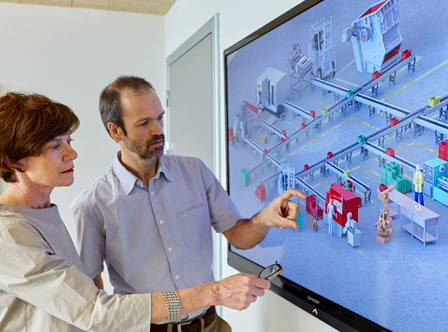INTERVIEW



Professor Dr. Eng. Eberhard Abele is the Director of the Institute of Production Management, Technology and Machine Tools at the Technical University of Darmstadt (Germany) and leader of a team working on new production technologies. He is also an expert in terms of the new “Industry 4.0” paradigm. In this interview, Abele explains this new paradigm and the advantages it offers for the industry.
1.- You are the leader of a team of 70 engineers in Darmstadt exclusively devoted to research focused on new production technologies. Regarding the European Industrial sector, why is R&D&I a key effort?
Industrial competitiveness refers to the ability of companies to compete in more and more global markets. R&D&I will be a key effort for all industrialised countries.
The development of new production technologies which allow new products or an advance in quality and costs will be in future a main challenge for competiveness. By developing technological innovations and novel systems solutions for the industrial sector our institute will help to reinforce the competitive strength of the economy in our region, throughout Germany and in Europe. Our research activities are aiming at promoting the economic development of our industrial society, with particular regard for social welfare and environmental compatibility.
2.- In this particular context, one of the most outstanding concepts that you have pioneered is connected to Industry 4.0. But what is it exactly? What kind of a competitive edge can it provide for the European economy? And, finally, what challenges will it face in the future?
The term "Industry 4.0" originates from a project in the high-tech strategy of the German government, which promotes the computerization of manufacturing. The major basics in Industry 4.0 are:
Interoperability: The ability of cyber-physical systems (i.e. workpiece carriers, assembly stations and products), humans and Smart Factories to connect and communicate with each other via the Internet of Things and the Internet of Services.
Virtualization: A virtual copy of the Smart Factory which is created by linking sensor data (from monitoring physical processes) with virtual plant models and simulation models.
Decentralization: The ability of cyber-physical systems within Smart Factories to make decisions on their own.
Real-Time Capability: The capability to collect and analyse data and provide the derived insights immediately (Big Data).
Until now, a lot of studies have been made by institutes or management consultants regarding the impact and visions of the Industry 4.0. But now the industrial side demands solutions! Which real effect Industry 4.0 may have to productivity, quality improvement or to a progress in flexibility?
This challenge demands closer cooperation between informatics and production engineering but as well between academia and Industry.
Some positive, already running examples for Industry 4.0 are machines which can predict failures and trigger maintenance processes autonomously or self-organized logistics which react to unexpected changes in production.
3.- A significant part of your career has been connected to research centres such as PTW or Fraunhofer, but you also have extensive industrial experience as you’ve worked for leading companies such as Bosch or Stihl. In your opinion, what kind of added value do technology centres produce for businesses and what will this relationship be like in the future?
Looking back to R&D&I- projects in general, the challenge is still to combine the creativity and innovative ideas of young researchers in research institutions with the process- and market-knowledge in industry.
Young researchers are often not aware of the complexity of a production system. They underestimate the speed in industry and the necessary robustness of a process or an innovation. From a prototype at a university level to a real innovative product is a big step!
In this aspect, the research centres in Basque Country which are aiming at professional scientists, looking for a continuity in research fields and customer relations may have a big advantage.
In my opinion, the Basque Country has an important network of technology centres that carry out excellence research and provide the industrial sector with valuable technological solutions and knowledge.
The efficiency of these research centres depends – like in all industrialised countries -upon their cooperation. How is synergy possible? How infrastructure can be shared?
In this regard you will find in the Basque Country a very positive example: the establishment of the Basque Network of Science, Technology and Innovation (RVCTI), with the aim of developing the infrastructure that would supply synergetical effects inside this region of Basque country.
Another positive example which could be seen from an international aspect is the IK4 Research Alliance, a technology centre alliance where each centre is managed individually but they work together in the development of projects and share infrastructure.
4.- Germany is, without a doubt, Europe’s main industrial driving force and a benchmark in terms of Industry 4.0. Based on this fact, how would you rate the contribution made by small companies with a long-standing industrial tradition such as the Basque Country as regards renovating its fabric via Industry 4.0?
Regarding the possible contribution to innovation in the industry 4.0 direction, you have to distinguish between users or system providers or solution providers. Regarding the solution provider area you will have as well, small and medium sized companies as of course international big players like Siemens and SAP.
In Germany, even small companies have embraced Industry 4.0 early, which has allowed to grow with it and gain a strong understanding of its workings and capabilities.
Each company should be aware that Industry 4.0 is changing the rules of the game as automation merges with the IT world and what its benefits could mean for the own operations.
Integration has begun and will give a chance to each company, whether small or big, independent if you are tool manufacturer or supplier, equipment operator or factory integrator.
5.- In recent years you have been able to co-operate with IK4-TEKNIKER. Could you please elaborate on this co-operation and point out future trends?
Yes indeed we often had the chance to get into contact with IK4-TEKNIKER and to share our ideas and to cooperate in projects. Since more than one decade we are organising jointly the High Speed Machining (HSM)- Conference.
The strong point always has been the highly qualified staff and the technological excellence due to the specialization in IK4-TEKNIKER. Regarding the infrastructure in labs, it is competitive to the world’s prestigious research centres.
One trend we can see in our contacts with companies; Customers asking for a so called “one stop solution” which means they are looking for one partner which will accompany him through the whole development and industrialisation process.
In this regard the IK4 Research Alliance may have synergy effects. On the one hand, IK4 Research Alliance can offer the high level of specialization by centre and on the other hand, allows the high degree of cooperation between the research teams of the centres to offer solutions along the whole innovation process to customers.



